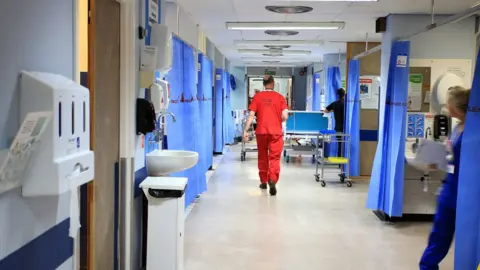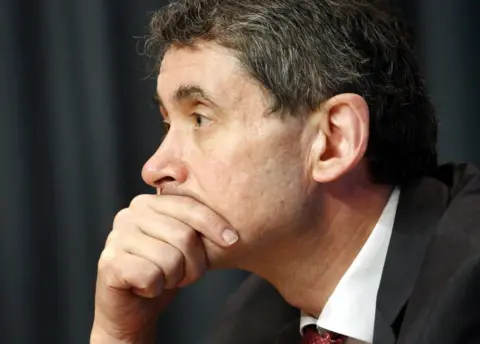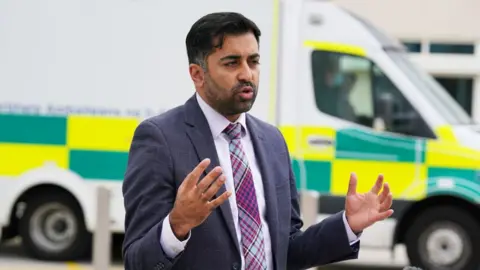Nicola Sturgeon says NHS principles 'not up for discussion'
The Scottish government will not "rip up" the founding principles of the NHS, Nicola Sturgeon has said.
The first minister said her government was "unequivocal" that it would not start charging people to access care.
It comes after documents seen by the BBC revealed NHS Scotland chiefs have discussed moving towards a "two-tier" system amid extreme pressure on the health service.
Ms Sturgeon said reform was needed but ruled out a move towards privatisation.
Draft minutes of a meeting of NHS directors in September show they discussed having wealthy patients pay for treatment. They also raised the possibility of curtailing some free prescriptions.
Ms Sturgeon said calls for changes to the NHS model were not unusual. "That's happened right throughout the history of the NHS and will always happen," she told BBC Scotland.
The first minister said a "process of reform" is currently under way in Scotland – pointing to work to improve unscheduled care and early intervention treatments to help relieve pressure on hospitals.
"Yes there are changes needed in the NHS," she said.
"But ... are we going to start charging people for accessing care or are we going to rip up these founding principles? The emphatic, unequivocal answer is to that is no."
 PA Media
PA MediaThe minutes of the meeting seen by BBC News, marked "in confidence not for onward sharing", include suggestions that hospitals should aim to send patients home more quickly, and pause the funding of some new drugs.
According to the document, the meeting began with an update about "recent conversations" with NHS Scotland chief executive Caroline Lamb.
Attendees were informed they had a "green light to present what boards feel reform may look like" and that "areas which were previously not viable options are now possibilities".
In response, the first minister told BBC Scotland: "The government decides the policy for the NHS, it decides the funding for the NHS, we fund the NHS to a higher level proportionately than other governments across the UK and we'll continue to do that.
"We'll continue to have the difficult discussions with those who run the NHS at the frontline about how we ensure the sustainability of the service.
"But the founding principles on which that service is based are not up for discussion by government and will not change. And I can't be clearer than that."
The NHS was created on 5 July 1948 on then health secretary Aneurin Bevan's pledge of "a universal health service without any insurance qualifications of any sort ... available to the whole population freely".
Controversial charges for dental and eye care were introduced within three years, contributing to Bevan's resignation from the government.
In recent years health services across the UK have struggled to cope with the Covid pandemic, an ageing population and staffing shortages.
Last month the BMA in Scotland said Scotland's NHS was in a "perilous situation" and urgent action was needed to tackle work load pressures. Official figures show about 6,000 nursing and midwifery posts are unfilled while A&E waiting time targets continue to be missed.
Scotland's former chief medical officer, Sir Harry Burns, criticised "overwhelmed" NHS Scotland chiefs for discussing a "two-tier" system.
 PA Media
PA MediaHe told BBC Radio Scotland's Drivetime they were looking for a "way out" amid criticism over waiting times and missed performance targets.
"Anything that sends us back to the old days I think, clearly, is crazy," Sir Harry said. "People want to live longer, healthy lives and there are ways of doing that.
"My frustration is ways of improving wellbeing are not being adopted because health boards are so focused on treating ill-health rather than creating good health."
Scottish Labour deputy leader Jackie Baillie said the changes would be an attempt to "slowly privatise our NHS" and reiterated her calls for Health Secretary Humza Yousaf to resign.
"These damning minutes show just how much harm Humza Yousaf and the SNP have done to our NHS," she said.
"Across our country hospitals are overwhelmed, staff are demoralised and patients are being put in danger. It's time Mr Yousaf did the right thing and went."
Scottish Tory health spokesman, Dr Sandesh Gulhane, said the report was "deeply alarming", also calling for Mr Yousaf's removal.
 PA Media
PA Media"Despite Humza Yousaf's protestations, the privatisation of Scotland's NHS seems to be under active consideration by the SNP," he added.
"This is outrageous. Healthcare must remain free at the point of use for everyone."
The health secretary has said the health service "must always" be based on individual patient need and "any suggestion" that it should be about the ability to pay was "abhorrent".
Meanwhile Dr Iain Kennedy, who chairs BMA Scotland, said his organisation was committed to maintaining the founding principles of the NHS.
"However it is beyond doubt that in order to avoid sleepwalking into the two tier system that threatens this fundamental principle of free healthcare we rightly hold so dear, we need a proper, open conversation about the NHS and how we make it sustainable now, and for generations to come," he said.
"Healthcare workers cannot do any more than they are currently doing - we need to be honest that the entire workforce is on its knees. NHS boards have a nigh on impossible task in making the budgets provided deliver everything that is being asked by the Scottish government.
"This is a dire situation for our NHS, with a massive lack of resources to meet spiralling demand across primary and secondary care. Things won't magically get better - we need an open and honest discussion and we need change, urgently - if we fall into a two-tier system our NHS, and everyone who needs it, has been failed."


Growing numbers of people are already delving into their savings because they can't stand the anxiety and pain of waiting for the NHS.
And there have already been clear warnings from doctors and nursing staff that things are unsafe and standards have dropped.
Why? Because there are not enough staff to meet ever growing demand
Against this backdrop, it is no surprise that reform is being discussed at the very highest level. But to see in black and white such radical ideas from NHS chief executives - even contemplating things like designing a two-tier system or pausing spending on drugs development - is extraordinary.
To see them spell out a disconnect between NHS leaders and the Scottish government shows how worried they are that the message to the public that the health service is not working as it should, is not getting through.
When I first started out reporting on health issues over five years ago now, doctors said there has to be a frank public conversation about what we can expect from the NHS.
These may be draft notes - not firm proposals - but it shows how fundamental some of the changes being discussed are.

